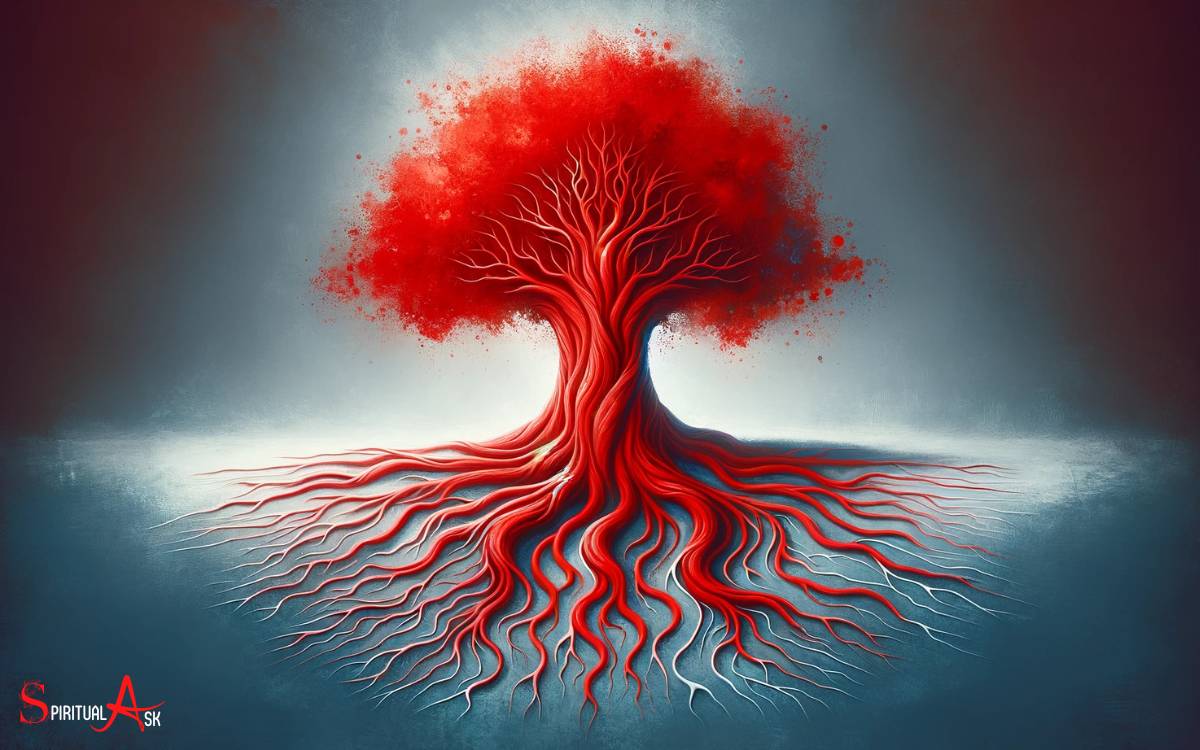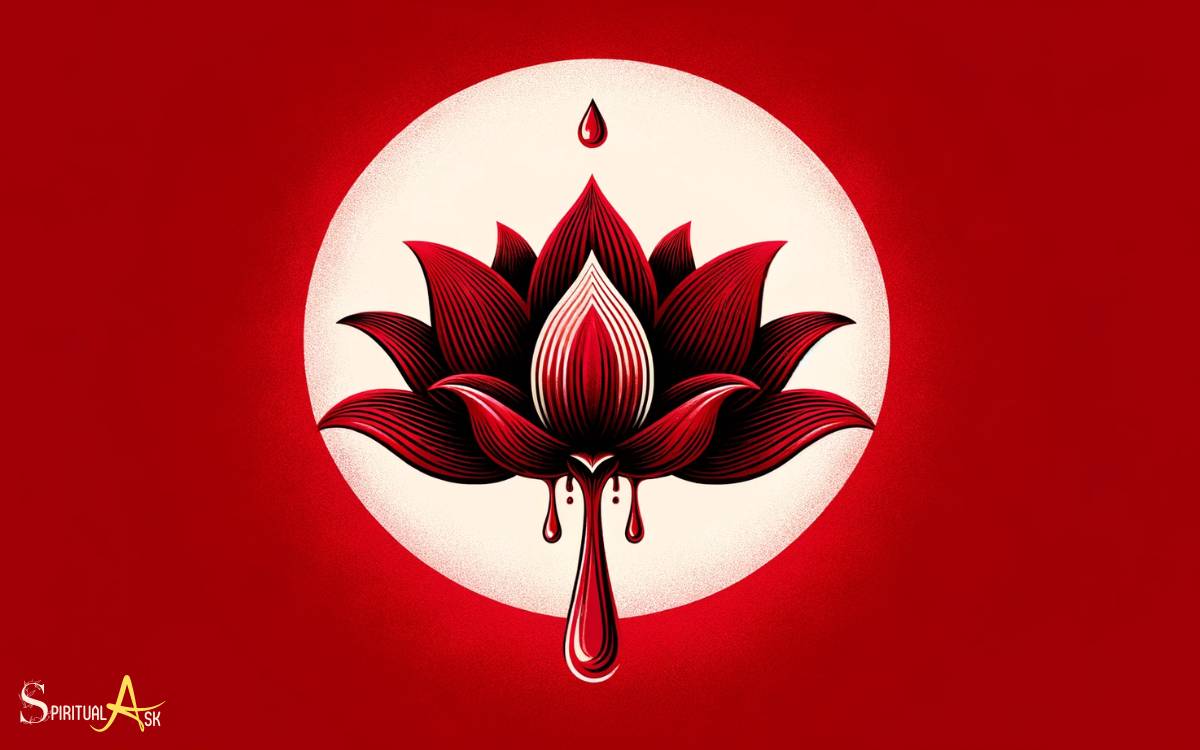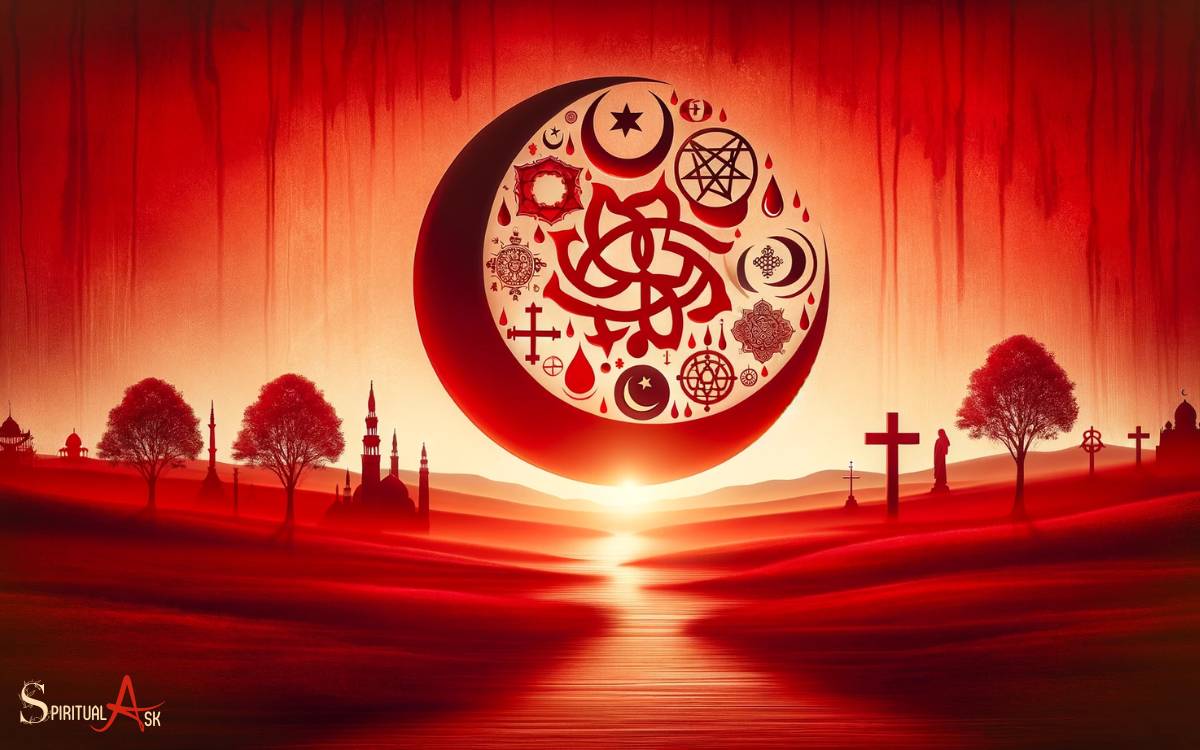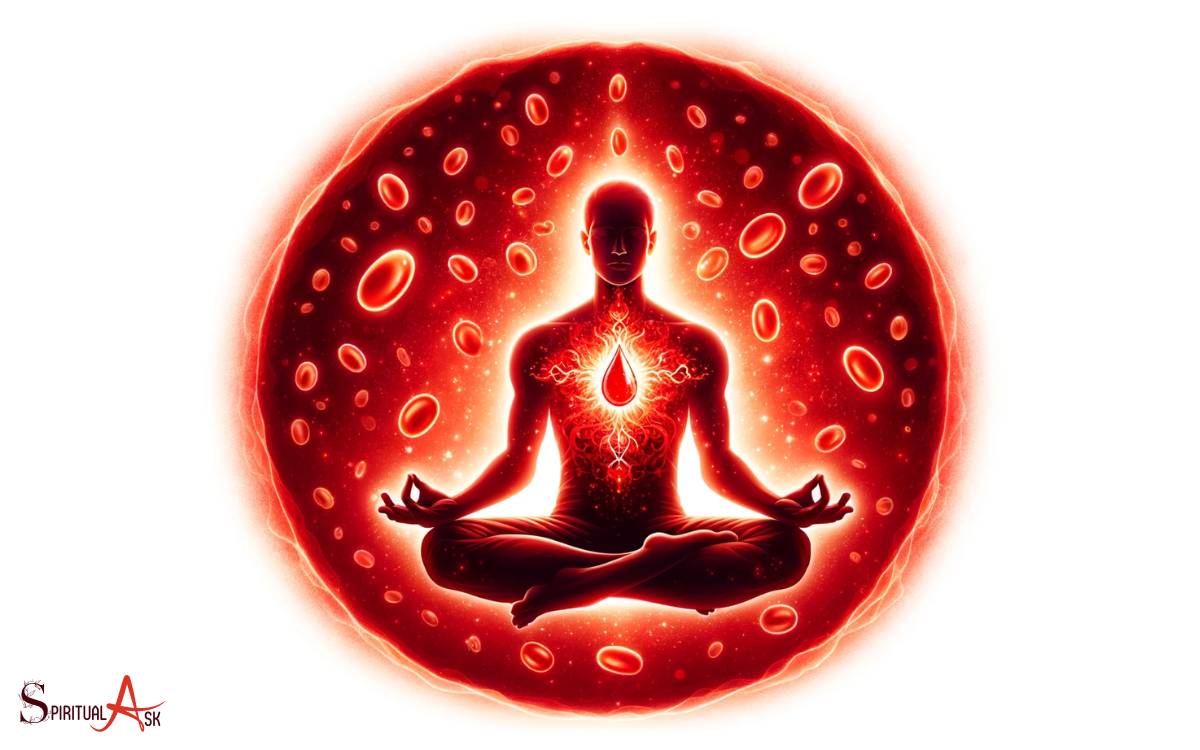What Does Blood Symbolize Spiritually? Life and Vitality!
Blood holds profound spiritual symbolism across various cultures and belief systems. It often represents life, vitality, and the essence of humanity.
In many traditions, blood signifies sacrifice, as it is considered the life force that can be offered to deities or used for the atonement of sins.
Additionally, blood can symbolize connection and kinship, denoting familial bonds and the shared lifeforce that unites relatives.
The spiritual symbolism of blood can be broken down into several key aspects:

Key Takeaway
Blood as a Symbol of Life

As I reflect on the spiritual significance of blood, I recognize that it is intrinsically intertwined with the concept of life. In many spiritual traditions, blood is seen as the essence of life itself, carrying the vitality and energy that sustains us.
It’s a symbol of the life force that flows through all living beings, connecting us to each other and to the divine. Blood represents the physical and the spiritual aspects of life, embodying the sacred nature of our existence.
It reminds us of our interconnectedness and the preciousness of life. Understanding blood as a symbol of life encourages us to honor and respect the gift of life, to cherish it in all its forms, and to recognize the divine presence within each living being.
Blood as a Symbol of Sacrifice
Often in spiritual contexts, blood symbolizes sacrifice, embodying the willingness to give of oneself for a greater purpose.

This symbolism can be seen in various religious and cultural practices, where blood is used to signify the act of offering or giving up something valuable for the benefit of others.
Here’s how blood is understood as a symbol of sacrifice:
- Atonement: Blood is often used in rituals as a means of atoning for wrongdoings or seeking forgiveness for sins.
- Renewal and Rebirth: Blood sacrifice is believed to bring about renewal and new beginnings, both personally and within a community.
- Communion: In some traditions, the sharing of blood represents a sacred bond and a shared commitment to a common cause.
- Protection and Redemption: Blood may symbolize protection from harm and the redemption of one’s spirit or soul.
Blood as a Symbol of Redemption
I’ve always found the concept of blood as a symbol of redemption to be deeply profound. It signifies the idea of atonement and the possibility of spiritual cleansing through blood.

Exploring this symbolism can shed light on the powerful themes of forgiveness and renewal in various spiritual traditions.
Blood and Atonement
After researching various religious and spiritual texts, it becomes evident that blood, when used in the context of atonement, symbolizes redemption and the cleansing of sins.
This symbolism is deeply rooted in many belief systems and is often associated with the idea of sacrifice and reconciliation with the divine.
Here’s a breakdown to help understand the significance of blood in atonement:
- Sacrificial Atonement: Blood is seen as a sacrificial offering to atone for wrongdoings or sins.
- Cleansing and Purification: The shedding of blood is believed to cleanse and purify the soul, washing away impurities and restoring spiritual purity.
- Reconciliation with the Divine: Blood atonement represents the reconciliation of the individual with the divine, bridging the gap caused by sin.
- Redemption and Forgiveness: The shedding of blood symbolizes redemption, offering a path to forgiveness and spiritual renewal.
Spiritual Cleansing Through Blood
Experiencing spiritual cleansing through blood involves embracing the symbolism of redemption and the renewal of the soul.
In many spiritual traditions, blood symbolizes the ultimate sacrifice and the means through which one can be purified and renewed.
It represents the shedding of the old and the emergence of the new, a powerful symbol of forgiveness and atonement.
This concept of spiritual cleansing through blood is rooted in the belief that through sacrifice, one can be redeemed and cleansed of past wrongs.
It serves as a reminder that everyone has the opportunity for a fresh start, free from the burdens of their past.
By embracing the symbolic power of blood, individuals can seek spiritual purification and find solace in the possibility of redemption and renewal.
Blood Symbolism in Christianity
As a Christian, I find the symbolism of blood to be deeply significant in my faith. In Christianity, blood is often seen as a symbol of atonement, representing the sacrifice made by Jesus Christ for the forgiveness of sins.

Additionally, the Eucharist, a central sacrament in Christian worship, involves the symbolic consumption of wine, representing the blood of Christ. These points highlight the profound spiritual significance of blood in the context of Christianity.
Blood as Atonement Symbol
In Christianity, blood’s symbolism as an atonement tool is deeply rooted in the sacrificial nature of Jesus’ crucifixion. This act is significant because it is believed to have provided atonement for the sins of humanity.
The symbolism of blood as atonement in Christianity can be understood through the following points:
- Sacrificial Offering: Jesus’ blood is seen as a sacrificial offering, representing the ultimate act of love and redemption.
- Cleansing and Forgiveness: The shedding of blood is viewed as a means of cleansing and forgiveness, washing away the sins of believers.
- Restoration of Relationship: It signifies the restoration of the broken relationship between God and humanity, bridging the gap caused by sin.
- Eternal Redemption: The atoning blood of Jesus is believed to provide believers with the hope of eternal redemption and salvation.
This symbolism emphasizes the central role of blood in reconciling humanity with the divine.
Eucharist and Blood Symbolism
Continuing from the previous subtopic, my understanding of the symbolism of blood in Christianity leads to the exploration of the Eucharist and its significance in representing blood symbolism.
In Christianity, the Eucharist, also known as Holy Communion or the Lord’s Supper, holds great importance.
During the Eucharist, the bread and wine are believed to undergo a spiritual transformation, becoming the body and blood of Jesus Christ.
This ritual symbolizes the sacrifice of Jesus and the shedding of his blood for the redemption of humanity. It serves as a powerful reminder of the ultimate act of love and atonement in Christian belief.
The act of partaking in the Eucharist is a deeply symbolic and spiritual practice, representing the believer’s union with Christ and the nourishment of the soul through the blood of Christ.
Blood Symbolism in Hinduism
While researching blood symbolism in Hinduism, I found that it holds significant spiritual and cultural importance.

In Hinduism, blood is symbolically significant in the following ways:
- Sacrificial Offerings: Blood sacrifices, although rare in modern Hinduism, were historically performed as offerings to deities.
- Life Force: Blood is considered the carrier of the life force (prana) within the body, connecting it to the concept of vitality and existence.
- Kumkum: A red powder made from turmeric and slaked lime, symbolizing blood, is used in religious rituals to mark the forehead as a symbol of sanctity.
- Goddess Kali: Blood offerings to the fierce goddess Kali symbolize the destruction of the ego and the liberation of the soul.
Understanding the symbolism of blood in Hinduism provides insight into the depth of its spiritual practices and beliefs.
Blood Symbolism in Other Spiritual Traditions
Exploring beyond Hinduism, my understanding of blood symbolism deepens as I delve into its significance in other spiritual traditions.
In Christianity, blood holds a central place, symbolizing atonement, redemption, and sacrifice through the blood of Jesus Christ.

The act of communion, where wine represents the blood of Christ, is a ritual that signifies spiritual nourishment and the forgiveness of sins.
In Judaism, blood symbolizes life and is considered sacred, with strict dietary laws governing its consumption.
The Passover ritual includes the symbolic use of blood on doorposts, signifying protection and deliverance.
In African traditional religions, blood symbolizes ancestral connections, life force, and the bond between the living and the spirits.
It is often used in rituals and ceremonies to communicate with the spiritual realm and seek blessings or protection.
Understanding these diverse perspectives enriches my comprehension of blood symbolism across various spiritual traditions.
The Power of Blood in Spiritual Practices
Delving into the power of blood in spiritual practices, I have come to recognize its significance as a potent symbol of connection, vitality, and spiritual transformation across diverse cultural and religious contexts.

The power of blood in spiritual practices is manifested in various ways:
- Sacred Offerings: Blood is used as a sacred offering in rituals and ceremonies to establish a profound connection with the divine or spiritual realm.
- Cleansing and Purification: Many spiritual traditions utilize blood in purification rituals to cleanse individuals or spaces from negative energies or sins.
- Symbol of Life Force: Blood symbolizes the life force running through all living beings, representing vitality, strength, and the essence of life itself.
- Initiation and Renewal: In some practices, blood is utilized in initiation rites, symbolizing a transformative journey and the renewal of one’s spiritual path.
The power of blood in spiritual practices underscores its deep-rooted symbolism and significance in various cultural and religious beliefs. The power of blood in spiritual practices underscores its deep-rooted symbolism and significance in various cultural and religious beliefs. Its connection to life, sacrifice, and purity contrasts intriguingly with the color white spiritual symbolism, which often represents peace, divinity, and transcendence. Together, these elements highlight the interplay of vitality and serenity in human attempts to connect with the divine or the sacred.
Conclusion
As I’ve learned about the spiritual symbolism of blood, I can’t help but be reminded of a time when I donated blood to help save a life.
It made me realize that blood is not just a physical substance, but a powerful symbol of life, sacrifice, and redemption in many spiritual traditions.
It’s a reminder that our actions and intentions have the power to bring life and healing to others, just like the life-giving properties of blood.






